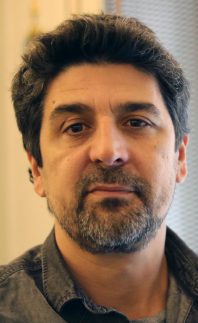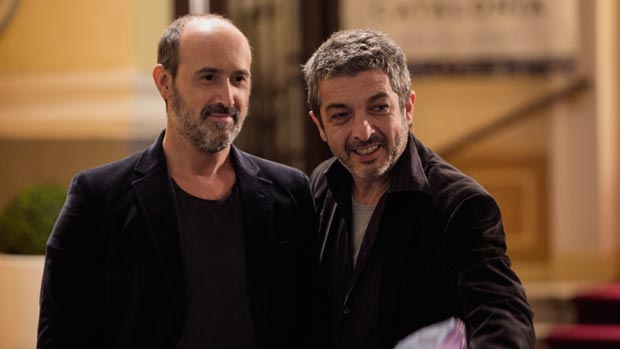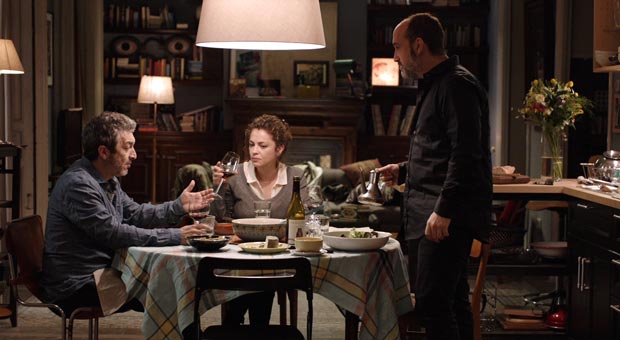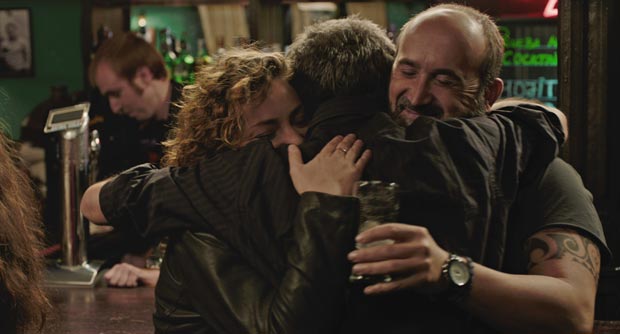
Her på Kulturbunkeren var vi så heldige at få lov til at møde den catalanske instruktør, Cesc Gay, da han var forbi Danmark op til premieren på hans seneste film, Truman – Venner for livet, der har skovlet priser ind i hjemlandet.
Det endte med at blive en meget barmfri og ærlig samtale om den lange proces, der ligger forud for at få en film lavet, når man både skriver og instruerer, og det store ubehag ved at se den færdige film på det store lærred, men også om de mange positive overraskelser, det endelige produkt har givet af sig.
Interviewet, der følger er uredigeret og uforkortet, hvorfor det er på engelsk.
Why did you decide to tell this particular story?
Because I had a similar experience, when my mother passed away. During that year I was writing a lot. I wasn’t thinking about making a movie, but I was writing my thoughts down like a diary. One year later, I just started reading what I had written and saw that there was a movie here about, how we deal with death. I was more interested in the those who weren’t sick and how friends, family and everybody else dealt with this situation. That was my inspiration for this movie.
When I saw it, I expected it to be a lot lighter, which is why it surprised me how somber and real it was. There is a lot of humor, but everything is grounded, was that intentional?
It is especially difficult for men to deal with this
It is the kind of movies I make. Real stories. You can be sad, you can be dramatic and you can be ironic, but be real. Movies in general, and especially in Hollywood, are constantly reminding you that you are watching a movie, so just eat your popcorn and relax. That is not the kind of movies I like to see. This is a sad movie, it is about death, it is about the end, it is about two friends, but the thing is that it is not easy to say goodbye. It is especially difficult for men to deal with this.

That is right, they don’t really say anything explicitly and the movie kind of revels in what we say, without saying it directly. However, I would still like to ask you what you think happened, since the two friends haven’t been in contact for so long?
I try not to think about that. It is a lot of work to just tell the story from beginning to end. During the last dinner scene, when Julián talks about eating too many pills, Ricardo Darín [the actor] asked me, if I thought he would actually go through with this or if he was just saying it? It is one thing to say something, but it is something completely different do actually do it. Ricardo is a really thorough actor, so he wanted to know, but I couldn’t give him an answer. The only thing I know is that [Julian] is a person who wants to control his life, so he has those pills to feel like he decides when to die. It gives him security.
Then, Javier Cámara asked me: “Do you think Tomas will get to see [Julian] again?”, and the only thing I could say is; “I don’t know”. You can see him again if you want to, you can take another plane. They probably meet again in five or six months, when [Julian] is really dying, but you have to put an end to those thoughts, because otherwise the story will never end.
I’m not that familiar with Spanish cinema, because we don’t really get that many all the way up here, but I was wondering how much of the actors are in the characters, because [Javier Cámara and Ricardo Darín] both share the same nationality as their characters. Did you fit the character with the actors, or did the actors mold the character?
It is a combination. I always write without any actors in mind, because then you can end in trouble, if the actor is not available. I first approached Javier, because he is a close friend of mine. It is one thing how Javier walks and talks, but it is something completely different, when you are picturing how the character walks and talks, so you have to build the character as you go along.
Another element is that I write in Catalan and then I translate it into Spanish. Of course, then I decided I wanted Ricardo, who is Argentinian to play the partof Julián, which meant I had to write again to make the role fit.

I am curious, how would you describe your directorial style?
I like to be active and part of every process
I think every director develops his own way of working. I never think about, “who am I as a director”, but you learn how you like to do things and do them that way. For example, when you are trying to find the locations, which is very important to me, because you are trying to adapt the script to the film, I like to drive to the locations and see them for myself. I don’t like the location manager just sending me pictures, I need to spend time there. I actually rented an apartment in Madrid before we had even found a location there. Then, I just walked down the street and in the end half of the locations in the film are just places I found. That is just my way of doing things.
I like to be active and part of every process, because the more you work, the more you actually find out what you are doing.
When you direct actors, do you then allow them a lot of time to improvise, or has the script been through so many iterations that when you actually film it is all set and done?
No, I just try to talk to the actors before we shoot. I like to talk with the actors and make sure they understand what we are doing and what it is all about. We talk about the script, we talk about the scene and we read the dialog, but it is not because I want to see them act. For instance, I met with Ricardo and Javier 10 days before the shoot. It was just the three of us. We listened to music, talked the script and about a lot of things. During that time, we all figured out what we were doing. You have to communicate. If the movie is too comedic, it is going to be bad. If the movie is too dramatic, it is also going to be bad. You have to balance it and the way to do that is by talking with the actors. That’s it.
When it comes to improvisation it doesn’t really exist in movies, because the camera is here, the light is there, the microphone can only record a certain area and the actors are told to move from this chair to that door and say their line standing on a particular spot. There is no room to improvise. What you have to do I just change everything a little between takes. Then, when you finally get to the editing you start to write the movie again, because you have to choose.
It sounds like a very personal film; given how much time you have spent outside production working on it.
I direct the films I want to direct
It is, because this is my work. I don’t work for a big studio. I write the scripts I want to write, and then I direct the films I want to direct. It is not always easy to do. I have a producer, who is trying to find the funding, but it is like Woody Allen has said it: “I can do these movies, because they are cheap”. If you are shooting a 100-million-dollar movie, you have to discuss with a lot of people. So, I have my freedom to these kinds of movies and I enjoy the entire process.

Since this film has basically been a part of your life, what are your proud of, either during the process or the final product?
The entire process, I hate the final product. I don’t like to face the final product, I just see all the little mistakes. Of course it has made very happy how the film has been received and the awards it has been given, but my mind is in another place. I just enjoy the process the most.
As you have already touched upon, the film has won a lot of awards, both Spanish and Catalan. Did that surprise you?
I just try to make the movie
I knew it was a movie, which probably could make some noise. Sometimes you deal with subjects and themes that are more alternative, but this is about death and love, and these are universal subjects. However, I never thing about [the awards]. I just try to make the movie.
What do you hope people will take away from the film?
It depends on the age and the person. A person once told me, everybody tells you how to live, your parents, your teacher, your friends and society, but nobody teaches you how to die. It is something we don’t talk about. Perhaps, this movie is just my attempt not to be afraid of death. It is my way of saying, “let us talk about this and let us face it”. We are all going to die, so why not share our emotions. It can often make people feel weak, especially men. It is not easy for guys to say, “I love you, I miss you etc.”. Women are different, because they actually talk to each other.
I can definitely see that in the way Julián and Tomás express themselves.
It is funny, because I had a very curious experience here. Last night, the movie was screened and afterwards I had to do a Q&A. During the screening is was looking for a place to drink beer, as always, because I don’t like to watch my movies. Then, I stumbled upon a bar with a lot of beers, which was exactly what I was looking for. While I was drinking the bartender realized that I was from Spain, at which point he started asking me, where I was from? I told him I’m here to show my movie and then he asked me what it was about. I said it is about two friends, one is dying and it is kind of a goodbye between them.
Then he just looked at me and said: “Yeah, it is very difficult for us [men]”. He started telling me about his brother who had died, and then he explained to me, how nobody talks about this with their friends in Denmark. I was sharing very deep feelings with a bartender about death, and he wanted advice on how to be open with his friend. It was a great experience for me to see, how my movie could inspire a surprising conversation.